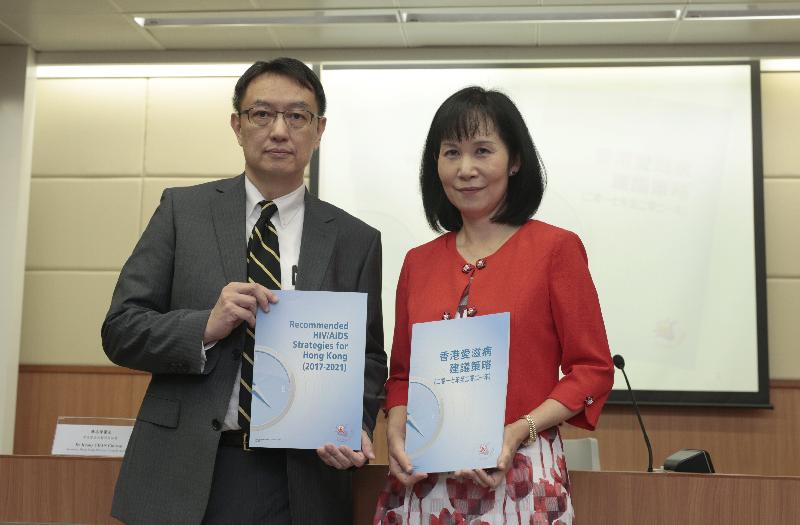Recommended strategies against HIV/AIDS for 2017-2021 published (with photo)
****************************************************************************
The Hong Kong Advisory Council on AIDS (ACA) today (May 22) published the Recommended HIV/AIDS Strategies for Hong Kong (2017-2021), the blueprint for a co-ordinated and consolidated response on local HIV prevention and control including policy recommendations and priority areas for action for the next five years.
Announcing the recommended strategies at a press conference today, the Chairperson of the ACA, Dr Susan Fan, said, "While Hong Kong has been maintaining a low HIV infection rate, the number of new HIV infections has continued to escalate in recent years. The next few years will be a critical point which may determine if the HIV epidemic spins out of control. We therefore call on government departments, healthcare workers, community organisations and society as a whole to make concerted efforts to prevent this from happening."
She added that the recommended strategies provide a framework for various key players to act in concert for the prevention, care and control of HIV/AIDS in the next five years.
In the 2017-2021 strategies, the ACA recommends five main directions for HIV prevention and control as follows:
- Men who have sex with men (MSM) should receive HIV antibody testing annually and use condoms consistently, irrespective of their self-perception of risk of infection;
- All HIV-positive patients should receive HIV treatment as soon as they get diagnosed;
- Capacity building in HIV-related service settings to identify drug-using clients and improvement of HIV prevention and testing services in drug rehabilitation and treatment services should be strengthened;
- Sex and HIV education should be intensified through a life skills-based education approach, and it should be age-appropriate, focusing on the avoidance of risky sexual behaviour and HIV-related discrimination; and
- Antenatal testing of pregnant women who are at risk of HIV infection should be strengthened to prevent mother-to-child transmission.
In the strategies, a number of emerging service needs have also been identified, including:
- Increasing infections among young MSM who have lower testing rates, condom use and linkage to care than older MSM;
- Loss of infected MSM at each stage of HIV care, i.e. diagnosis, linkage to care and receiving treatment;
- Increasing use of instant messaging mobile applications to find sex partners;
- Increasing recreational drug use among MSM and transgenders (TGs);
- Low HIV antibody testing rates among at-risk populations; and
- Late diagnosis and linkage to care among ethnic minorities.
To address the current HIV epidemic and service needs, the strategies set out priorities to intensify action for two primary target populations, namely MSM and people living with HIV, as well as other key populations i.e. people who inject drugs, ethnic minorities, male-to-female TGs, and female sex workers and their male clients.
Locally, the annual number of HIV infections newly reported to the Department of Health (DH) continued to rise, reaching a cumulative total of 8 410 cases as at end-2016. Infections among MSM dominated the epidemic and accounted for 60 per cent of reported cases in 2016. The estimated proportion of those with HIV infection was 5.86 per cent among MSM, 18.6 per cent among male-to-female TGs, 1 per cent among people who inject drugs, 0 per cent among female sex workers, and 0.1 per cent among the general population. Similar to some overseas countries and major cities of the Mainland, it is projected that the local epidemic would continue to be dominated by MSM.
Also attending the press conference, the Secretary of the ACA and the Consultant (Special Preventive Programme) of the Centre for Health Protection of the DH, Dr Kenny Chan, said, "We will continue to closely work with AIDS service organisations, the healthcare profession and academia, community partners, relevant bureaux/departments and organisations to reinforce our response to HIV/AIDS under the new strategies for the realisation of zero new infections, zero AIDS-related deaths and zero discrimination set out by the Joint United Nations Programme on HIV/AIDS."
The 2017-2021 strategies is the fifth set of strategies developed by the ACA since 1994. An objective, integrative and consultative approach with public health orientation was adopted during its formulation. The new strategies have taken into consideration global and local HIV/AIDS situation and future projection, current local responses, evidence of scientific developments, recommendations among international health agencies as well as the opinion of stakeholders and the public collated during the consultation exercise, and have also drawn reference from the previous strategies.
The Recommended HIV/AIDS Strategies for Hong Kong (2017-2021), a supplement on the process of formulating the strategies and the Report of the Community Stakeholders' Consultation for the Development of the Strategies have been uploaded to the ACA website (www.aca.gov.hk). The public may also visit the DH's Virtual AIDS Office (www.aids.gov.hk) for more information on the local situation and programmes on HIV/AIDS.
Ends/Monday, May 22, 2017
Issued at HKT 16:45
Issued at HKT 16:45
NNNN





